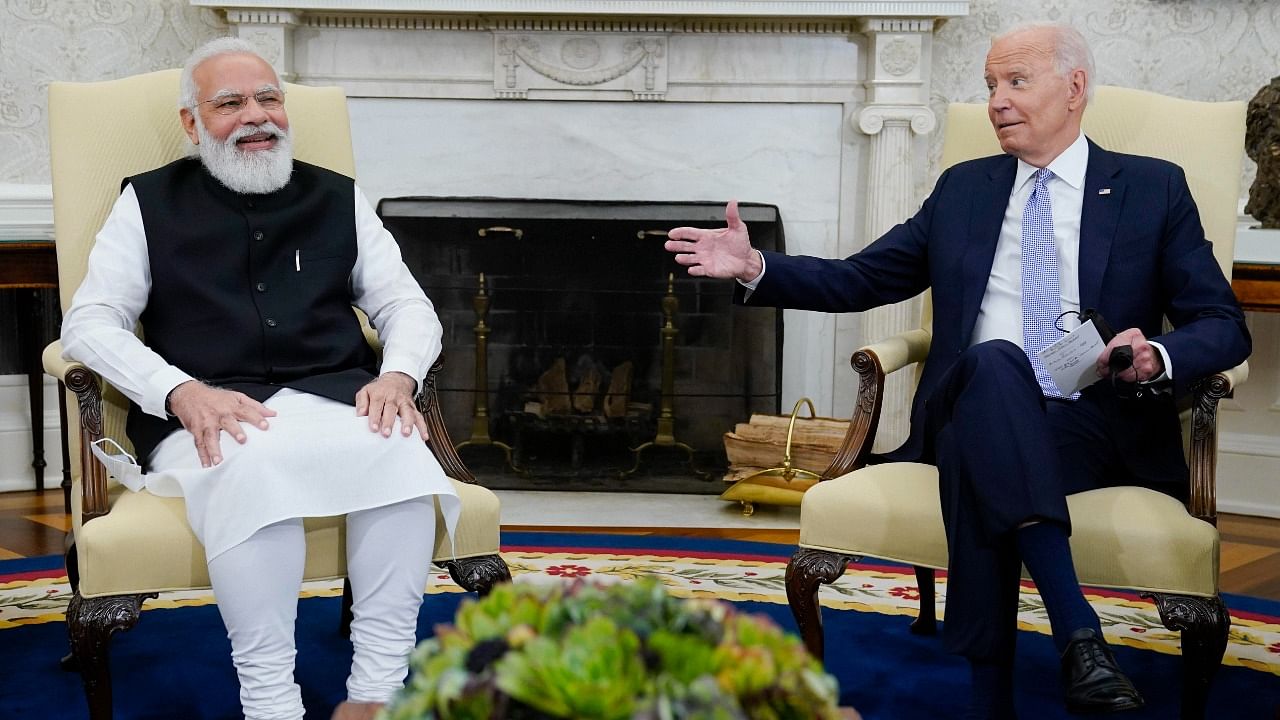
Prime Minister Narendra Modi and President Joe Biden will hold a virtual meeting on Monday, as India and the United States will try to narrow differences between the two nations over the Russia-Ukraine conflict.
The virtual meeting between Modi and Biden will be followed by India-US 2+2 ministerial dialogue in Washington D.C. on the same day. External Affairs Minister S Jaishankar and Defence Minister Rajnath Singh will join their US counterparts – Secretary of State Anthony Blinken and Secretary of Defence Lloyd Austin – for the 2+2 dialogue. The back-to-back high-level engagements are apparently intended to reaffirm the commitment of the two governments to the comprehensive global strategic partnership, even as they were not on the same page in condemning Russia’s military operations in Ukraine.
The two leaders will review ongoing bilateral cooperation and “exchange views on recent developments in South Asia, the Indo-Pacific region and global issues of mutual interest”, according to a press-release issued by the Ministry of External Affairs of the Government of India in New Delhi. The press-release did not directly refer to the Russia-Ukraine conflict as a part of the agenda of the talks between the Prime Minister and the US President.
Biden’s Press Secretary Jen Psaki, however, said in Washington D.C. that the US President would continue his “close consultations” with the Prime Minister of India “on the consequences of Russia’s brutal war against Ukraine and mitigating its destabilizing impact on global food supply and commodity markets”.
New Delhi’s refusal to toe the Biden Administration’s line on Russia-Ukraine conflict added to the strains in India-US relations. India abstained from voting on several US-backed resolutions at the United Nations Security Council and General Assembly condemning Russia’s invasion of Ukraine. A virtual summit of the Quad on March 3 last saw Modi resisting Biden’s bid to get the four-nation coalition to formally criticize Russia. The Prime Minister stressed that the coalition comprising India, Japan, Australian and the US should remain focussed on dealing with the belligerence of China in the Indo-Pacific region.
The Biden Administration of late not-so-subtly conveyed to New Delhi its displeasure over India's discussion with Russia to explore ways to continue bilateral trade circumventing the sanctions the US and the other western nations imposed on President Vladimir Putin's nation after he ordered launch of military operations in Ukraine on February 24 last.
Daleep Singh, the US President's Deputy National Security Advisor on International Economics, of late stated in New Delhi that the nations trying to circumvent the restrictions the US imposed on transactions with banks in Russia would face “consequences”. He also said that the US would not like to see rapid acceleration of India's imports from Russia, be it energy or any other commodities.
India already started to buy about 16 million barrels of crude oil from sanction-hit Russia at a discounted price, notwithstanding criticism in the US and the UK.
New Delhi and Moscow are also discussing expanding use of national currencies, rupee and rouble, to circumvent the US sanctions on Russia and pay for imports from each other.
Biden and Modi will discuss cooperation on a range of issues including ending the Covid-19 pandemic, countering the climate crisis, strengthening the global economy and upholding a free, open, rules-based international order to bolster security, democracy, and prosperity in the Indo-Pacific, said Psaki, who earlier endorsed Daleep Singh’s tough-talks in New Delhi.
“The virtual meeting will enable both sides to continue their regular and high-level engagement aimed at further strengthening the bilateral Comprehensive Global Strategic Partnership,” Arindam Bagchi, the spokesperson of the MEA, said in New Delhi.
Check out latest DH videos here
